Inclusive Pedagogical Practice for Children with Additional Needs
VerifiedAdded on 2021/06/17
|22
|5397
|22
Report
AI Summary
This report examines inclusive pedagogical practices for a group of 30 children aged 0-5, including those with diverse needs such as Down syndrome, cerebral palsy, autism, and ADHD. It begins by outlining current funding models and national quality standards in Australia that support inclusive education, detailing the NSW Department of Education's funding programs and the Australian Children’s Education and Care Quality Authority’s standards. The report then explores the professional and organizational support required, highlighting the roles of speech-language pathologists, mental health professionals, nutritionists, neurologists, paediatricians, audiologists, physiotherapists, and occupational therapists in addressing specific needs. Finally, the report touches on the issues and dynamics that impact a service's capacity to include children with additional needs and how to promote learning experiences and interactions to build on children’s strengths. The report emphasizes the importance of tailored support and a welcoming environment for all children.
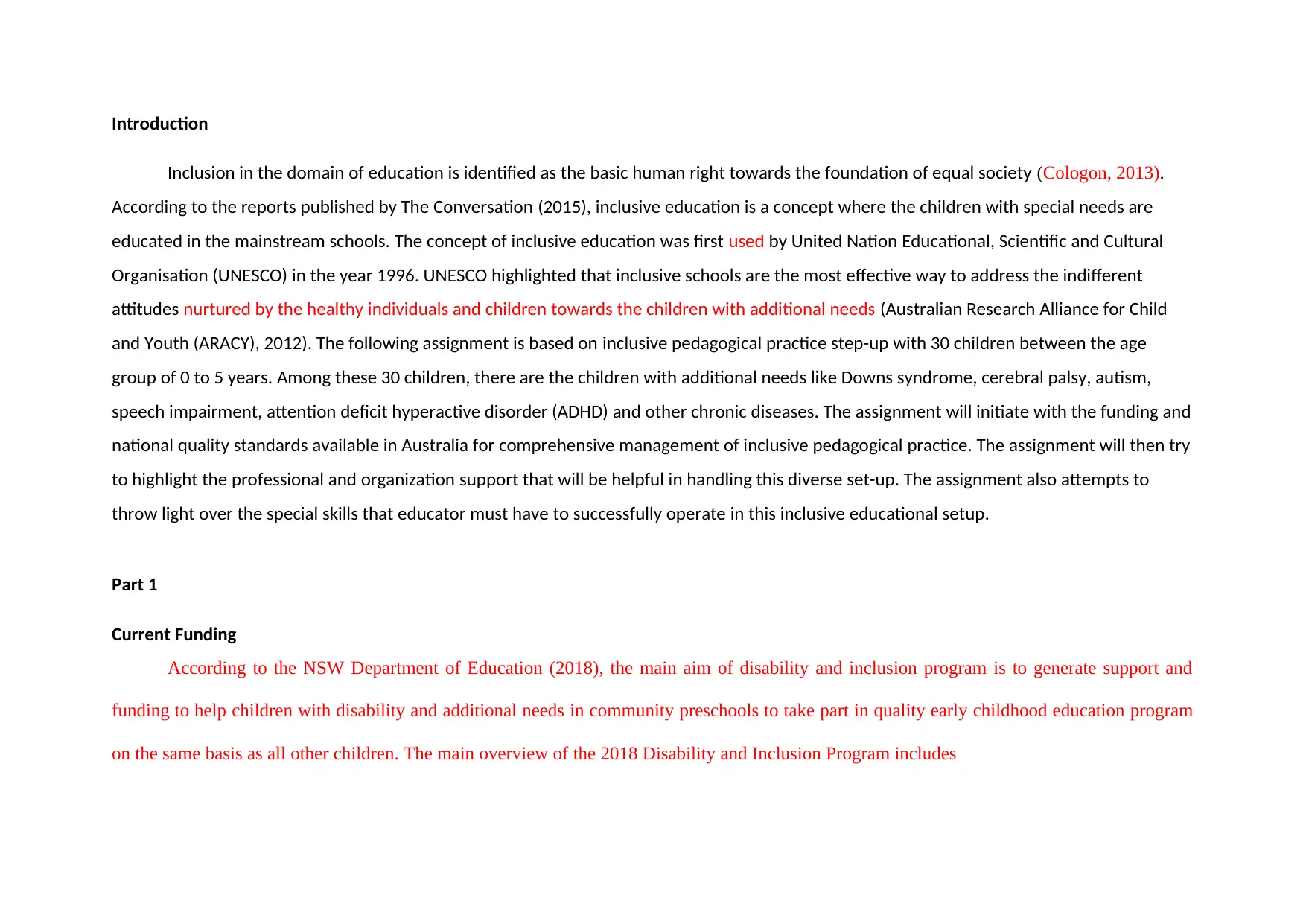
Introduction
Inclusion in the domain of education is identified as the basic human right towards the foundation of equal society (Cologon, 2013).
According to the reports published by The Conversation (2015), inclusive education is a concept where the children with special needs are
educated in the mainstream schools. The concept of inclusive education was first used by United Nation Educational, Scientific and Cultural
Organisation (UNESCO) in the year 1996. UNESCO highlighted that inclusive schools are the most effective way to address the indifferent
attitudes nurtured by the healthy individuals and children towards the children with additional needs (Australian Research Alliance for Child
and Youth (ARACY), 2012). The following assignment is based on inclusive pedagogical practice step-up with 30 children between the age
group of 0 to 5 years. Among these 30 children, there are the children with additional needs like Downs syndrome, cerebral palsy, autism,
speech impairment, attention deficit hyperactive disorder (ADHD) and other chronic diseases. The assignment will initiate with the funding and
national quality standards available in Australia for comprehensive management of inclusive pedagogical practice. The assignment will then try
to highlight the professional and organization support that will be helpful in handling this diverse set-up. The assignment also attempts to
throw light over the special skills that educator must have to successfully operate in this inclusive educational setup.
Part 1
Current Funding
According to the NSW Department of Education (2018), the main aim of disability and inclusion program is to generate support and
funding to help children with disability and additional needs in community preschools to take part in quality early childhood education program
on the same basis as all other children. The main overview of the 2018 Disability and Inclusion Program includes
Inclusion in the domain of education is identified as the basic human right towards the foundation of equal society (Cologon, 2013).
According to the reports published by The Conversation (2015), inclusive education is a concept where the children with special needs are
educated in the mainstream schools. The concept of inclusive education was first used by United Nation Educational, Scientific and Cultural
Organisation (UNESCO) in the year 1996. UNESCO highlighted that inclusive schools are the most effective way to address the indifferent
attitudes nurtured by the healthy individuals and children towards the children with additional needs (Australian Research Alliance for Child
and Youth (ARACY), 2012). The following assignment is based on inclusive pedagogical practice step-up with 30 children between the age
group of 0 to 5 years. Among these 30 children, there are the children with additional needs like Downs syndrome, cerebral palsy, autism,
speech impairment, attention deficit hyperactive disorder (ADHD) and other chronic diseases. The assignment will initiate with the funding and
national quality standards available in Australia for comprehensive management of inclusive pedagogical practice. The assignment will then try
to highlight the professional and organization support that will be helpful in handling this diverse set-up. The assignment also attempts to
throw light over the special skills that educator must have to successfully operate in this inclusive educational setup.
Part 1
Current Funding
According to the NSW Department of Education (2018), the main aim of disability and inclusion program is to generate support and
funding to help children with disability and additional needs in community preschools to take part in quality early childhood education program
on the same basis as all other children. The main overview of the 2018 Disability and Inclusion Program includes
Paraphrase This Document
Need a fresh take? Get an instant paraphrase of this document with our AI Paraphraser
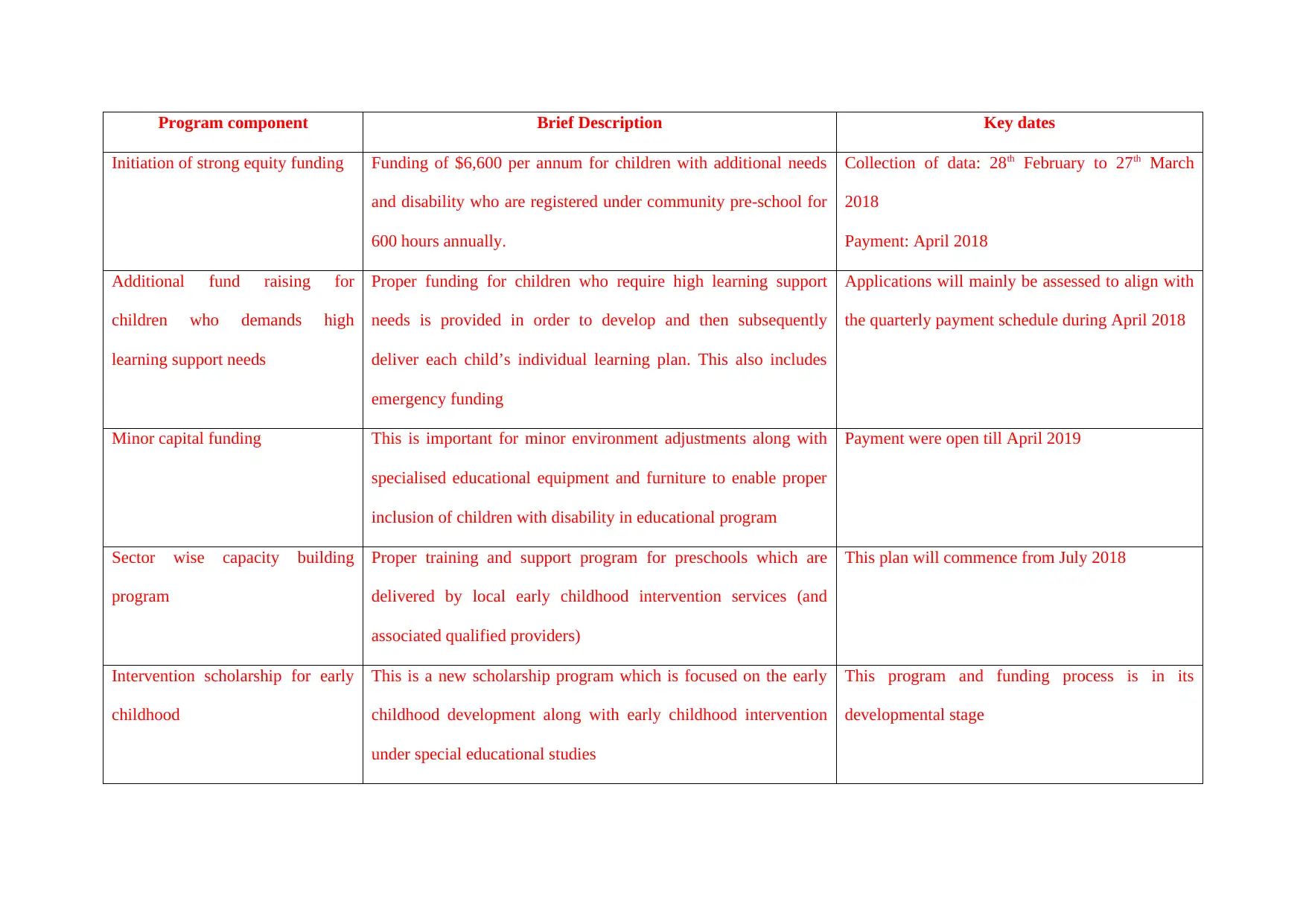
Program component Brief Description Key dates
Initiation of strong equity funding Funding of $6,600 per annum for children with additional needs
and disability who are registered under community pre-school for
600 hours annually.
Collection of data: 28th February to 27th March
2018
Payment: April 2018
Additional fund raising for
children who demands high
learning support needs
Proper funding for children who require high learning support
needs is provided in order to develop and then subsequently
deliver each child’s individual learning plan. This also includes
emergency funding
Applications will mainly be assessed to align with
the quarterly payment schedule during April 2018
Minor capital funding This is important for minor environment adjustments along with
specialised educational equipment and furniture to enable proper
inclusion of children with disability in educational program
Payment were open till April 2019
Sector wise capacity building
program
Proper training and support program for preschools which are
delivered by local early childhood intervention services (and
associated qualified providers)
This plan will commence from July 2018
Intervention scholarship for early
childhood
This is a new scholarship program which is focused on the early
childhood development along with early childhood intervention
under special educational studies
This program and funding process is in its
developmental stage
Initiation of strong equity funding Funding of $6,600 per annum for children with additional needs
and disability who are registered under community pre-school for
600 hours annually.
Collection of data: 28th February to 27th March
2018
Payment: April 2018
Additional fund raising for
children who demands high
learning support needs
Proper funding for children who require high learning support
needs is provided in order to develop and then subsequently
deliver each child’s individual learning plan. This also includes
emergency funding
Applications will mainly be assessed to align with
the quarterly payment schedule during April 2018
Minor capital funding This is important for minor environment adjustments along with
specialised educational equipment and furniture to enable proper
inclusion of children with disability in educational program
Payment were open till April 2019
Sector wise capacity building
program
Proper training and support program for preschools which are
delivered by local early childhood intervention services (and
associated qualified providers)
This plan will commence from July 2018
Intervention scholarship for early
childhood
This is a new scholarship program which is focused on the early
childhood development along with early childhood intervention
under special educational studies
This program and funding process is in its
developmental stage
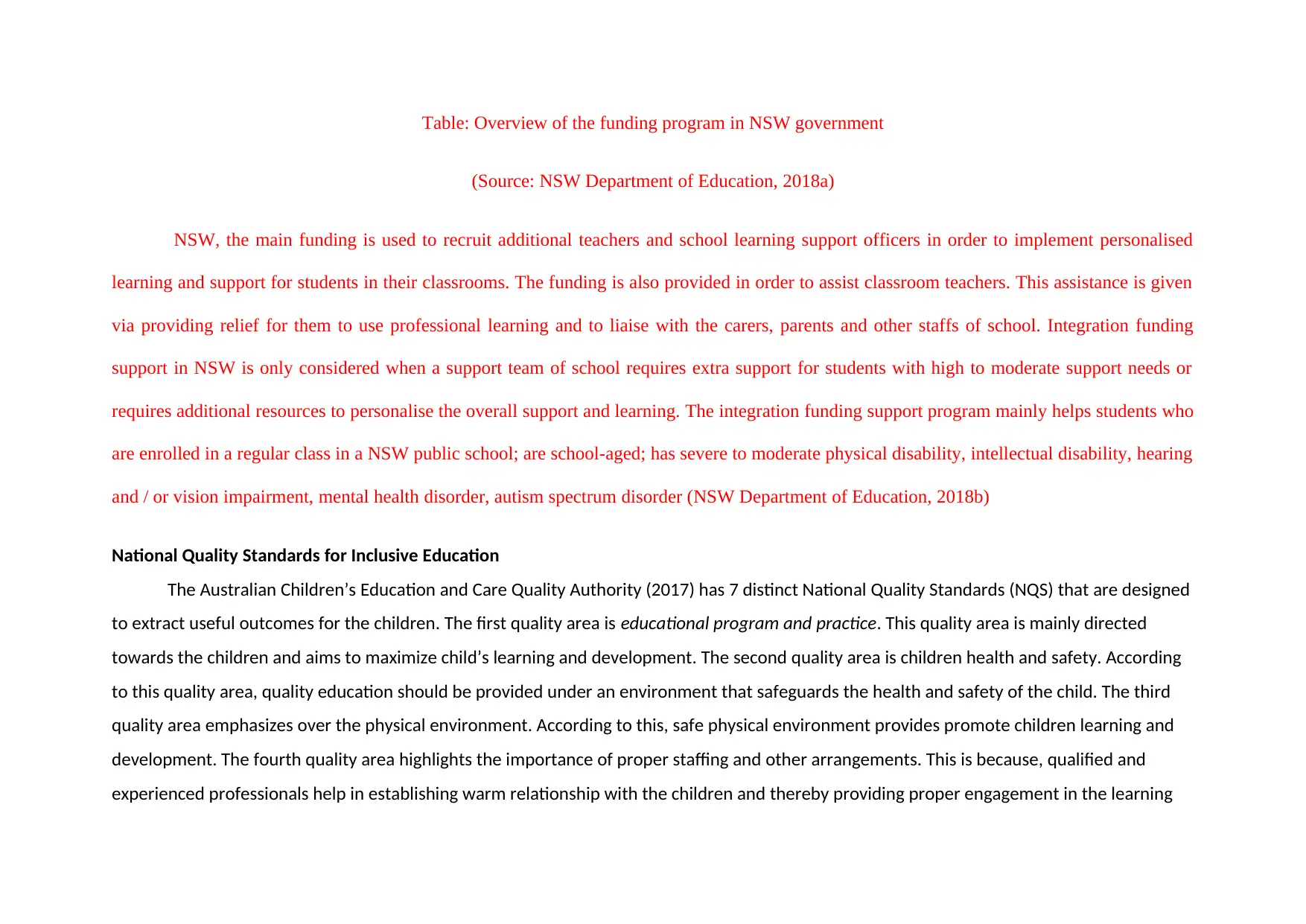
Table: Overview of the funding program in NSW government
(Source: NSW Department of Education, 2018a)
NSW, the main funding is used to recruit additional teachers and school learning support officers in order to implement personalised
learning and support for students in their classrooms. The funding is also provided in order to assist classroom teachers. This assistance is given
via providing relief for them to use professional learning and to liaise with the carers, parents and other staffs of school. Integration funding
support in NSW is only considered when a support team of school requires extra support for students with high to moderate support needs or
requires additional resources to personalise the overall support and learning. The integration funding support program mainly helps students who
are enrolled in a regular class in a NSW public school; are school-aged; has severe to moderate physical disability, intellectual disability, hearing
and / or vision impairment, mental health disorder, autism spectrum disorder (NSW Department of Education, 2018b)
National Quality Standards for Inclusive Education
The Australian Children’s Education and Care Quality Authority (2017) has 7 distinct National Quality Standards (NQS) that are designed
to extract useful outcomes for the children. The first quality area is educational program and practice. This quality area is mainly directed
towards the children and aims to maximize child’s learning and development. The second quality area is children health and safety. According
to this quality area, quality education should be provided under an environment that safeguards the health and safety of the child. The third
quality area emphasizes over the physical environment. According to this, safe physical environment provides promote children learning and
development. The fourth quality area highlights the importance of proper staffing and other arrangements. This is because, qualified and
experienced professionals help in establishing warm relationship with the children and thereby providing proper engagement in the learning
(Source: NSW Department of Education, 2018a)
NSW, the main funding is used to recruit additional teachers and school learning support officers in order to implement personalised
learning and support for students in their classrooms. The funding is also provided in order to assist classroom teachers. This assistance is given
via providing relief for them to use professional learning and to liaise with the carers, parents and other staffs of school. Integration funding
support in NSW is only considered when a support team of school requires extra support for students with high to moderate support needs or
requires additional resources to personalise the overall support and learning. The integration funding support program mainly helps students who
are enrolled in a regular class in a NSW public school; are school-aged; has severe to moderate physical disability, intellectual disability, hearing
and / or vision impairment, mental health disorder, autism spectrum disorder (NSW Department of Education, 2018b)
National Quality Standards for Inclusive Education
The Australian Children’s Education and Care Quality Authority (2017) has 7 distinct National Quality Standards (NQS) that are designed
to extract useful outcomes for the children. The first quality area is educational program and practice. This quality area is mainly directed
towards the children and aims to maximize child’s learning and development. The second quality area is children health and safety. According
to this quality area, quality education should be provided under an environment that safeguards the health and safety of the child. The third
quality area emphasizes over the physical environment. According to this, safe physical environment provides promote children learning and
development. The fourth quality area highlights the importance of proper staffing and other arrangements. This is because, qualified and
experienced professionals help in establishing warm relationship with the children and thereby providing proper engagement in the learning
⊘ This is a preview!⊘
Do you want full access?
Subscribe today to unlock all pages.

Trusted by 1+ million students worldwide
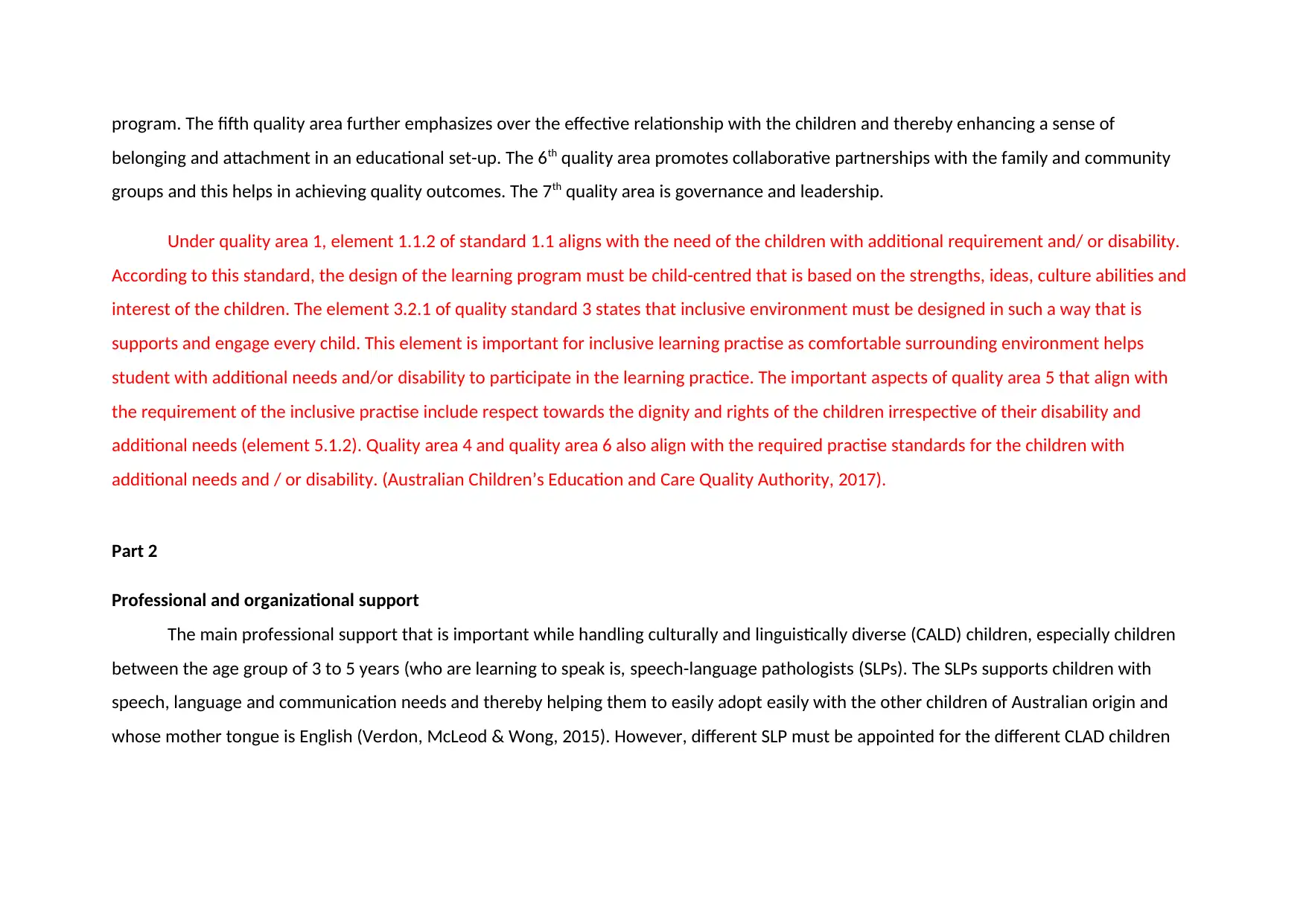
program. The fifth quality area further emphasizes over the effective relationship with the children and thereby enhancing a sense of
belonging and attachment in an educational set-up. The 6th quality area promotes collaborative partnerships with the family and community
groups and this helps in achieving quality outcomes. The 7th quality area is governance and leadership.
Under quality area 1, element 1.1.2 of standard 1.1 aligns with the need of the children with additional requirement and/ or disability.
According to this standard, the design of the learning program must be child-centred that is based on the strengths, ideas, culture abilities and
interest of the children. The element 3.2.1 of quality standard 3 states that inclusive environment must be designed in such a way that is
supports and engage every child. This element is important for inclusive learning practise as comfortable surrounding environment helps
student with additional needs and/or disability to participate in the learning practice. The important aspects of quality area 5 that align with
the requirement of the inclusive practise include respect towards the dignity and rights of the children irrespective of their disability and
additional needs (element 5.1.2). Quality area 4 and quality area 6 also align with the required practise standards for the children with
additional needs and / or disability. (Australian Children’s Education and Care Quality Authority, 2017).
Part 2
Professional and organizational support
The main professional support that is important while handling culturally and linguistically diverse (CALD) children, especially children
between the age group of 3 to 5 years (who are learning to speak is, speech-language pathologists (SLPs). The SLPs supports children with
speech, language and communication needs and thereby helping them to easily adopt easily with the other children of Australian origin and
whose mother tongue is English (Verdon, McLeod & Wong, 2015). However, different SLP must be appointed for the different CLAD children
belonging and attachment in an educational set-up. The 6th quality area promotes collaborative partnerships with the family and community
groups and this helps in achieving quality outcomes. The 7th quality area is governance and leadership.
Under quality area 1, element 1.1.2 of standard 1.1 aligns with the need of the children with additional requirement and/ or disability.
According to this standard, the design of the learning program must be child-centred that is based on the strengths, ideas, culture abilities and
interest of the children. The element 3.2.1 of quality standard 3 states that inclusive environment must be designed in such a way that is
supports and engage every child. This element is important for inclusive learning practise as comfortable surrounding environment helps
student with additional needs and/or disability to participate in the learning practice. The important aspects of quality area 5 that align with
the requirement of the inclusive practise include respect towards the dignity and rights of the children irrespective of their disability and
additional needs (element 5.1.2). Quality area 4 and quality area 6 also align with the required practise standards for the children with
additional needs and / or disability. (Australian Children’s Education and Care Quality Authority, 2017).
Part 2
Professional and organizational support
The main professional support that is important while handling culturally and linguistically diverse (CALD) children, especially children
between the age group of 3 to 5 years (who are learning to speak is, speech-language pathologists (SLPs). The SLPs supports children with
speech, language and communication needs and thereby helping them to easily adopt easily with the other children of Australian origin and
whose mother tongue is English (Verdon, McLeod & Wong, 2015). However, different SLP must be appointed for the different CLAD children
Paraphrase This Document
Need a fresh take? Get an instant paraphrase of this document with our AI Paraphraser
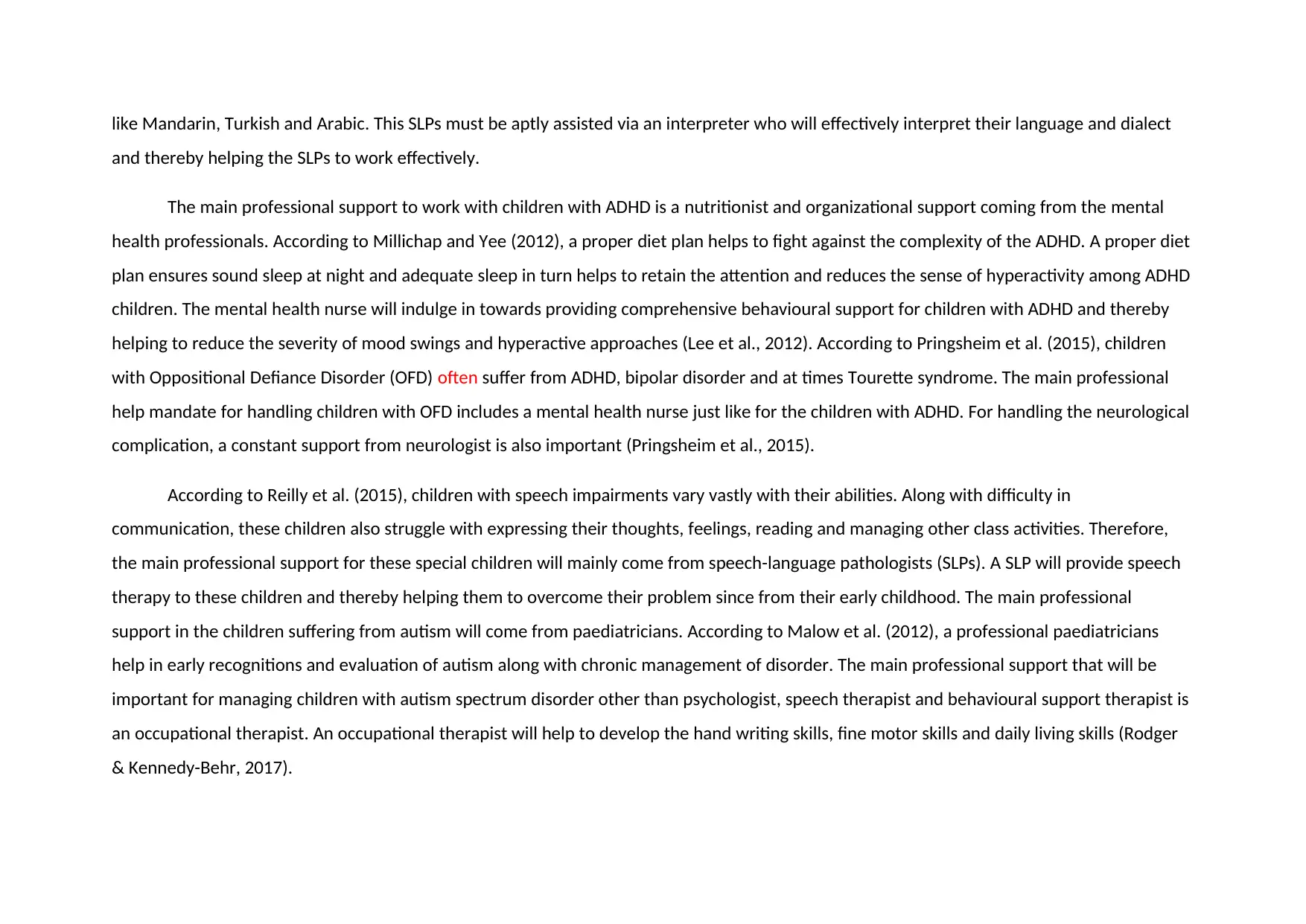
like Mandarin, Turkish and Arabic. This SLPs must be aptly assisted via an interpreter who will effectively interpret their language and dialect
and thereby helping the SLPs to work effectively.
The main professional support to work with children with ADHD is a nutritionist and organizational support coming from the mental
health professionals. According to Millichap and Yee (2012), a proper diet plan helps to fight against the complexity of the ADHD. A proper diet
plan ensures sound sleep at night and adequate sleep in turn helps to retain the attention and reduces the sense of hyperactivity among ADHD
children. The mental health nurse will indulge in towards providing comprehensive behavioural support for children with ADHD and thereby
helping to reduce the severity of mood swings and hyperactive approaches (Lee et al., 2012). According to Pringsheim et al. (2015), children
with Oppositional Defiance Disorder (OFD) often suffer from ADHD, bipolar disorder and at times Tourette syndrome. The main professional
help mandate for handling children with OFD includes a mental health nurse just like for the children with ADHD. For handling the neurological
complication, a constant support from neurologist is also important (Pringsheim et al., 2015).
According to Reilly et al. (2015), children with speech impairments vary vastly with their abilities. Along with difficulty in
communication, these children also struggle with expressing their thoughts, feelings, reading and managing other class activities. Therefore,
the main professional support for these special children will mainly come from speech-language pathologists (SLPs). A SLP will provide speech
therapy to these children and thereby helping them to overcome their problem since from their early childhood. The main professional
support in the children suffering from autism will come from paediatricians. According to Malow et al. (2012), a professional paediatricians
help in early recognitions and evaluation of autism along with chronic management of disorder. The main professional support that will be
important for managing children with autism spectrum disorder other than psychologist, speech therapist and behavioural support therapist is
an occupational therapist. An occupational therapist will help to develop the hand writing skills, fine motor skills and daily living skills (Rodger
& Kennedy-Behr, 2017).
and thereby helping the SLPs to work effectively.
The main professional support to work with children with ADHD is a nutritionist and organizational support coming from the mental
health professionals. According to Millichap and Yee (2012), a proper diet plan helps to fight against the complexity of the ADHD. A proper diet
plan ensures sound sleep at night and adequate sleep in turn helps to retain the attention and reduces the sense of hyperactivity among ADHD
children. The mental health nurse will indulge in towards providing comprehensive behavioural support for children with ADHD and thereby
helping to reduce the severity of mood swings and hyperactive approaches (Lee et al., 2012). According to Pringsheim et al. (2015), children
with Oppositional Defiance Disorder (OFD) often suffer from ADHD, bipolar disorder and at times Tourette syndrome. The main professional
help mandate for handling children with OFD includes a mental health nurse just like for the children with ADHD. For handling the neurological
complication, a constant support from neurologist is also important (Pringsheim et al., 2015).
According to Reilly et al. (2015), children with speech impairments vary vastly with their abilities. Along with difficulty in
communication, these children also struggle with expressing their thoughts, feelings, reading and managing other class activities. Therefore,
the main professional support for these special children will mainly come from speech-language pathologists (SLPs). A SLP will provide speech
therapy to these children and thereby helping them to overcome their problem since from their early childhood. The main professional
support in the children suffering from autism will come from paediatricians. According to Malow et al. (2012), a professional paediatricians
help in early recognitions and evaluation of autism along with chronic management of disorder. The main professional support that will be
important for managing children with autism spectrum disorder other than psychologist, speech therapist and behavioural support therapist is
an occupational therapist. An occupational therapist will help to develop the hand writing skills, fine motor skills and daily living skills (Rodger
& Kennedy-Behr, 2017).
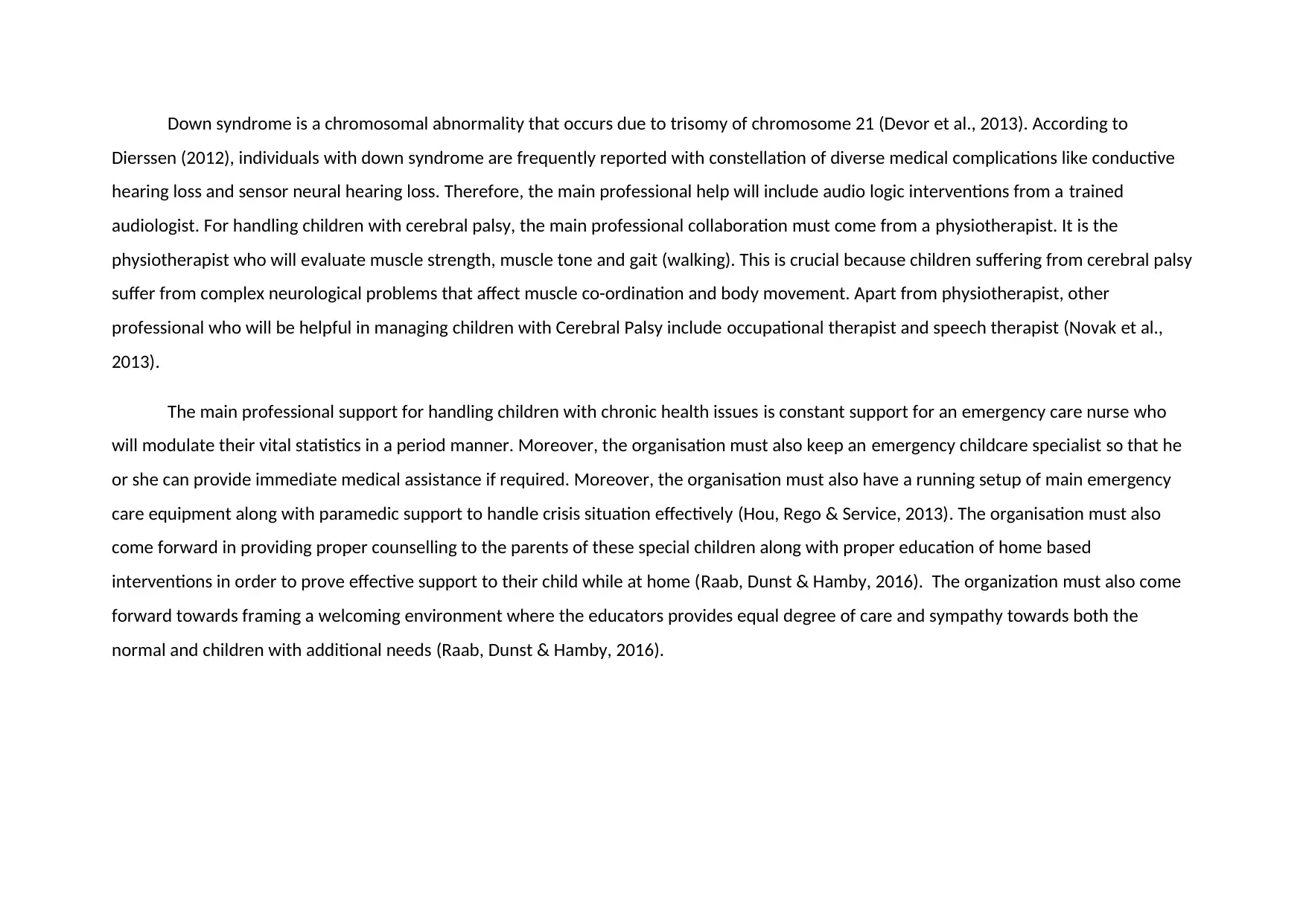
Down syndrome is a chromosomal abnormality that occurs due to trisomy of chromosome 21 (Devor et al., 2013). According to
Dierssen (2012), individuals with down syndrome are frequently reported with constellation of diverse medical complications like conductive
hearing loss and sensor neural hearing loss. Therefore, the main professional help will include audio logic interventions from a trained
audiologist. For handling children with cerebral palsy, the main professional collaboration must come from a physiotherapist. It is the
physiotherapist who will evaluate muscle strength, muscle tone and gait (walking). This is crucial because children suffering from cerebral palsy
suffer from complex neurological problems that affect muscle co-ordination and body movement. Apart from physiotherapist, other
professional who will be helpful in managing children with Cerebral Palsy include occupational therapist and speech therapist (Novak et al.,
2013).
The main professional support for handling children with chronic health issues is constant support for an emergency care nurse who
will modulate their vital statistics in a period manner. Moreover, the organisation must also keep an emergency childcare specialist so that he
or she can provide immediate medical assistance if required. Moreover, the organisation must also have a running setup of main emergency
care equipment along with paramedic support to handle crisis situation effectively (Hou, Rego & Service, 2013). The organisation must also
come forward in providing proper counselling to the parents of these special children along with proper education of home based
interventions in order to prove effective support to their child while at home (Raab, Dunst & Hamby, 2016). The organization must also come
forward towards framing a welcoming environment where the educators provides equal degree of care and sympathy towards both the
normal and children with additional needs (Raab, Dunst & Hamby, 2016).
Dierssen (2012), individuals with down syndrome are frequently reported with constellation of diverse medical complications like conductive
hearing loss and sensor neural hearing loss. Therefore, the main professional help will include audio logic interventions from a trained
audiologist. For handling children with cerebral palsy, the main professional collaboration must come from a physiotherapist. It is the
physiotherapist who will evaluate muscle strength, muscle tone and gait (walking). This is crucial because children suffering from cerebral palsy
suffer from complex neurological problems that affect muscle co-ordination and body movement. Apart from physiotherapist, other
professional who will be helpful in managing children with Cerebral Palsy include occupational therapist and speech therapist (Novak et al.,
2013).
The main professional support for handling children with chronic health issues is constant support for an emergency care nurse who
will modulate their vital statistics in a period manner. Moreover, the organisation must also keep an emergency childcare specialist so that he
or she can provide immediate medical assistance if required. Moreover, the organisation must also have a running setup of main emergency
care equipment along with paramedic support to handle crisis situation effectively (Hou, Rego & Service, 2013). The organisation must also
come forward in providing proper counselling to the parents of these special children along with proper education of home based
interventions in order to prove effective support to their child while at home (Raab, Dunst & Hamby, 2016). The organization must also come
forward towards framing a welcoming environment where the educators provides equal degree of care and sympathy towards both the
normal and children with additional needs (Raab, Dunst & Hamby, 2016).
⊘ This is a preview!⊘
Do you want full access?
Subscribe today to unlock all pages.

Trusted by 1+ million students worldwide
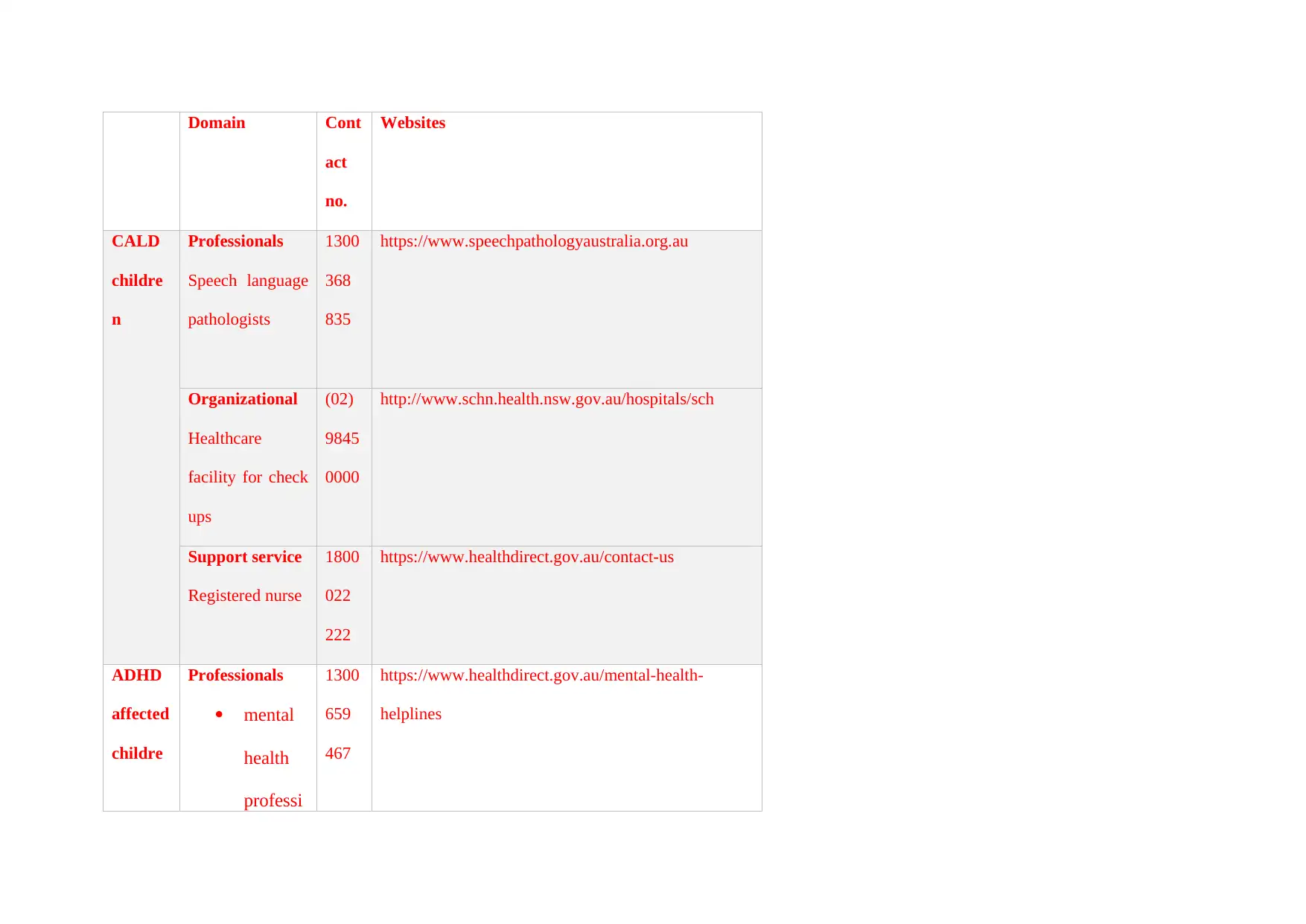
Domain Cont
act
no.
Websites
CALD
childre
n
Professionals
Speech language
pathologists
1300
368
835
https://www.speechpathologyaustralia.org.au
Organizational
Healthcare
facility for check
ups
(02)
9845
0000
http://www.schn.health.nsw.gov.au/hospitals/sch
Support service
Registered nurse
1800
022
222
https://www.healthdirect.gov.au/contact-us
ADHD
affected
childre
Professionals
mental
health
professi
1300
659
467
https://www.healthdirect.gov.au/mental-health-
helplines
act
no.
Websites
CALD
childre
n
Professionals
Speech language
pathologists
1300
368
835
https://www.speechpathologyaustralia.org.au
Organizational
Healthcare
facility for check
ups
(02)
9845
0000
http://www.schn.health.nsw.gov.au/hospitals/sch
Support service
Registered nurse
1800
022
222
https://www.healthdirect.gov.au/contact-us
ADHD
affected
childre
Professionals
mental
health
professi
1300
659
467
https://www.healthdirect.gov.au/mental-health-
helplines
Paraphrase This Document
Need a fresh take? Get an instant paraphrase of this document with our AI Paraphraser
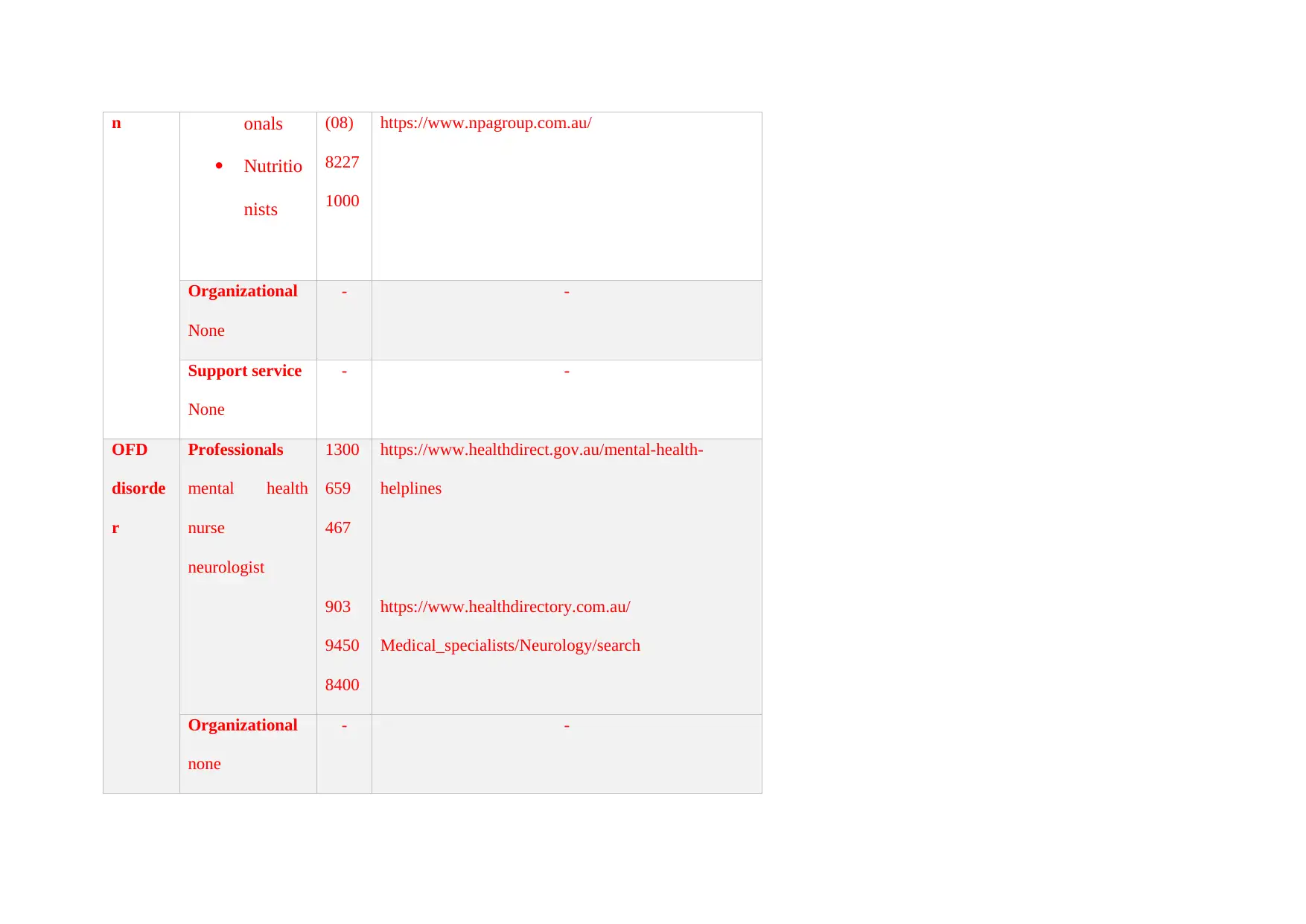
n onals
Nutritio
nists
(08)
8227
1000
https://www.npagroup.com.au/
Organizational
None
- -
Support service
None
- -
OFD
disorde
r
Professionals
mental health
nurse
neurologist
1300
659
467
903
9450
8400
https://www.healthdirect.gov.au/mental-health-
helplines
https://www.healthdirectory.com.au/
Medical_specialists/Neurology/search
Organizational
none
- -
Nutritio
nists
(08)
8227
1000
https://www.npagroup.com.au/
Organizational
None
- -
Support service
None
- -
OFD
disorde
r
Professionals
mental health
nurse
neurologist
1300
659
467
903
9450
8400
https://www.healthdirect.gov.au/mental-health-
helplines
https://www.healthdirectory.com.au/
Medical_specialists/Neurology/search
Organizational
none
- -
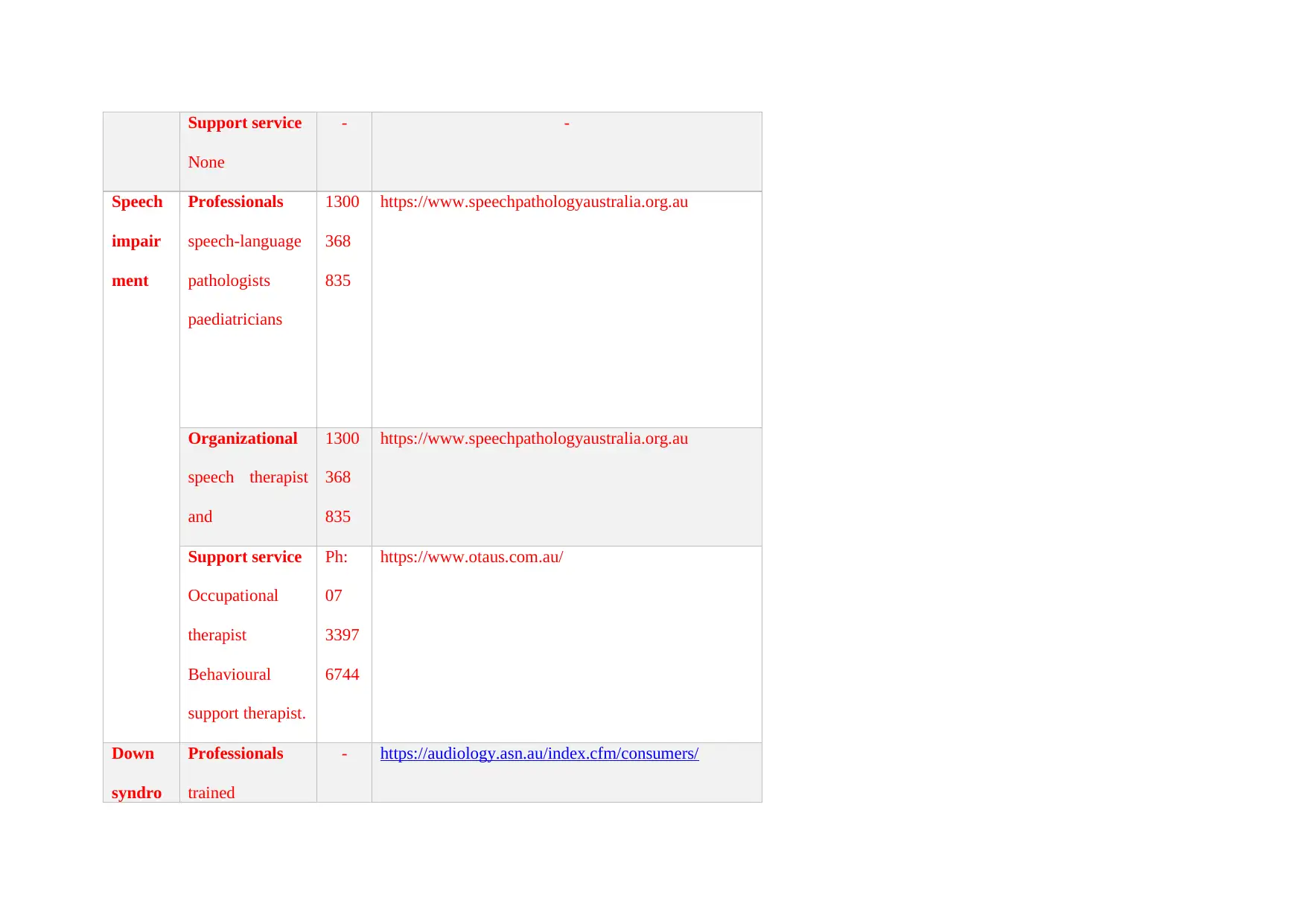
Support service
None
- -
Speech
impair
ment
Professionals
speech-language
pathologists
paediatricians
1300
368
835
https://www.speechpathologyaustralia.org.au
Organizational
speech therapist
and
1300
368
835
https://www.speechpathologyaustralia.org.au
Support service
Occupational
therapist
Behavioural
support therapist.
Ph:
07
3397
6744
https://www.otaus.com.au/
Down
syndro
Professionals
trained
- https://audiology.asn.au/index.cfm/consumers/
None
- -
Speech
impair
ment
Professionals
speech-language
pathologists
paediatricians
1300
368
835
https://www.speechpathologyaustralia.org.au
Organizational
speech therapist
and
1300
368
835
https://www.speechpathologyaustralia.org.au
Support service
Occupational
therapist
Behavioural
support therapist.
Ph:
07
3397
6744
https://www.otaus.com.au/
Down
syndro
Professionals
trained
- https://audiology.asn.au/index.cfm/consumers/
⊘ This is a preview!⊘
Do you want full access?
Subscribe today to unlock all pages.

Trusted by 1+ million students worldwide
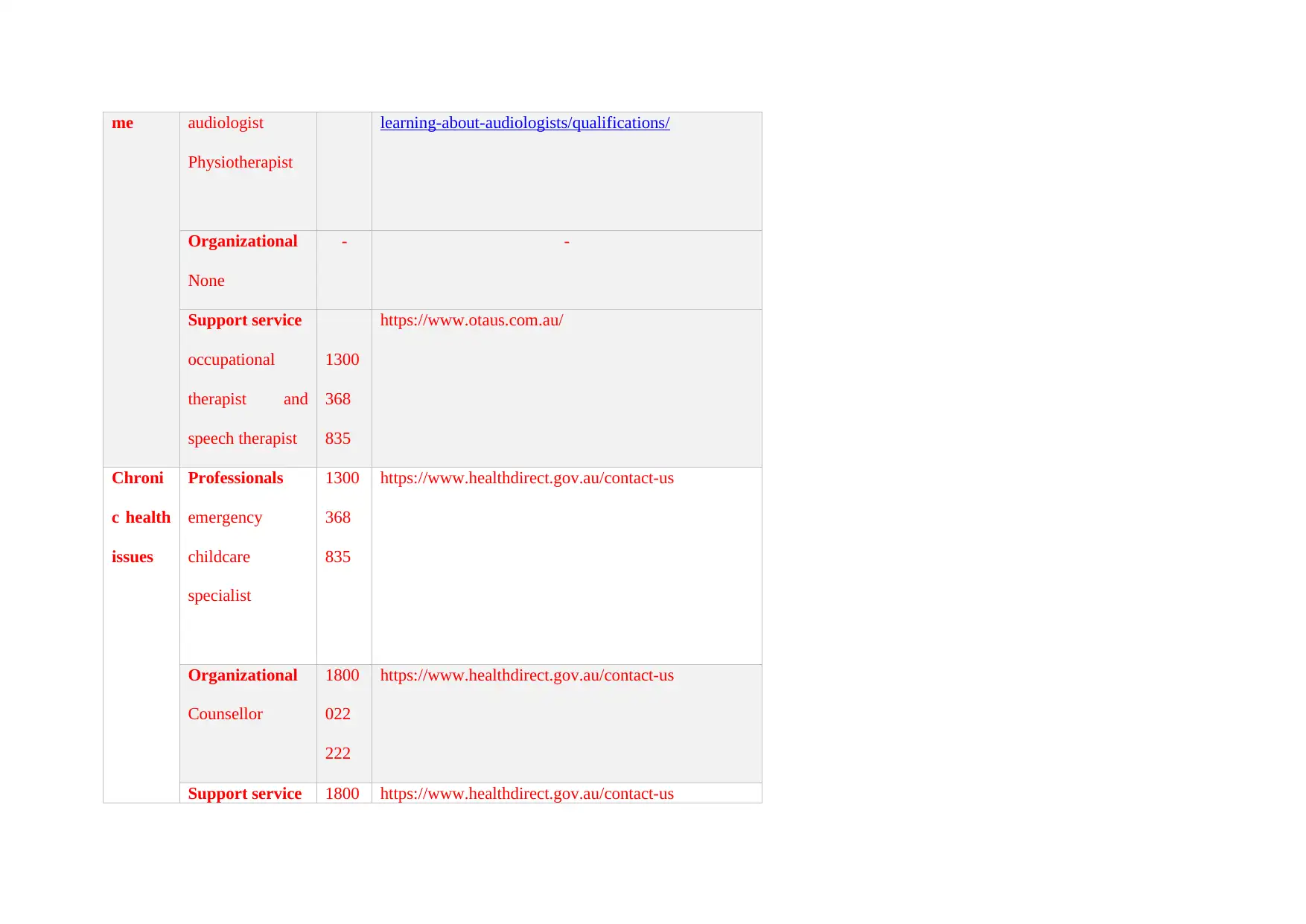
me audiologist
Physiotherapist
learning-about-audiologists/qualifications/
Organizational
None
- -
Support service
occupational
therapist and
speech therapist
1300
368
835
https://www.otaus.com.au/
Chroni
c health
issues
Professionals
emergency
childcare
specialist
1300
368
835
https://www.healthdirect.gov.au/contact-us
Organizational
Counsellor
1800
022
222
https://www.healthdirect.gov.au/contact-us
Support service 1800 https://www.healthdirect.gov.au/contact-us
Physiotherapist
learning-about-audiologists/qualifications/
Organizational
None
- -
Support service
occupational
therapist and
speech therapist
1300
368
835
https://www.otaus.com.au/
Chroni
c health
issues
Professionals
emergency
childcare
specialist
1300
368
835
https://www.healthdirect.gov.au/contact-us
Organizational
Counsellor
1800
022
222
https://www.healthdirect.gov.au/contact-us
Support service 1800 https://www.healthdirect.gov.au/contact-us
Paraphrase This Document
Need a fresh take? Get an instant paraphrase of this document with our AI Paraphraser
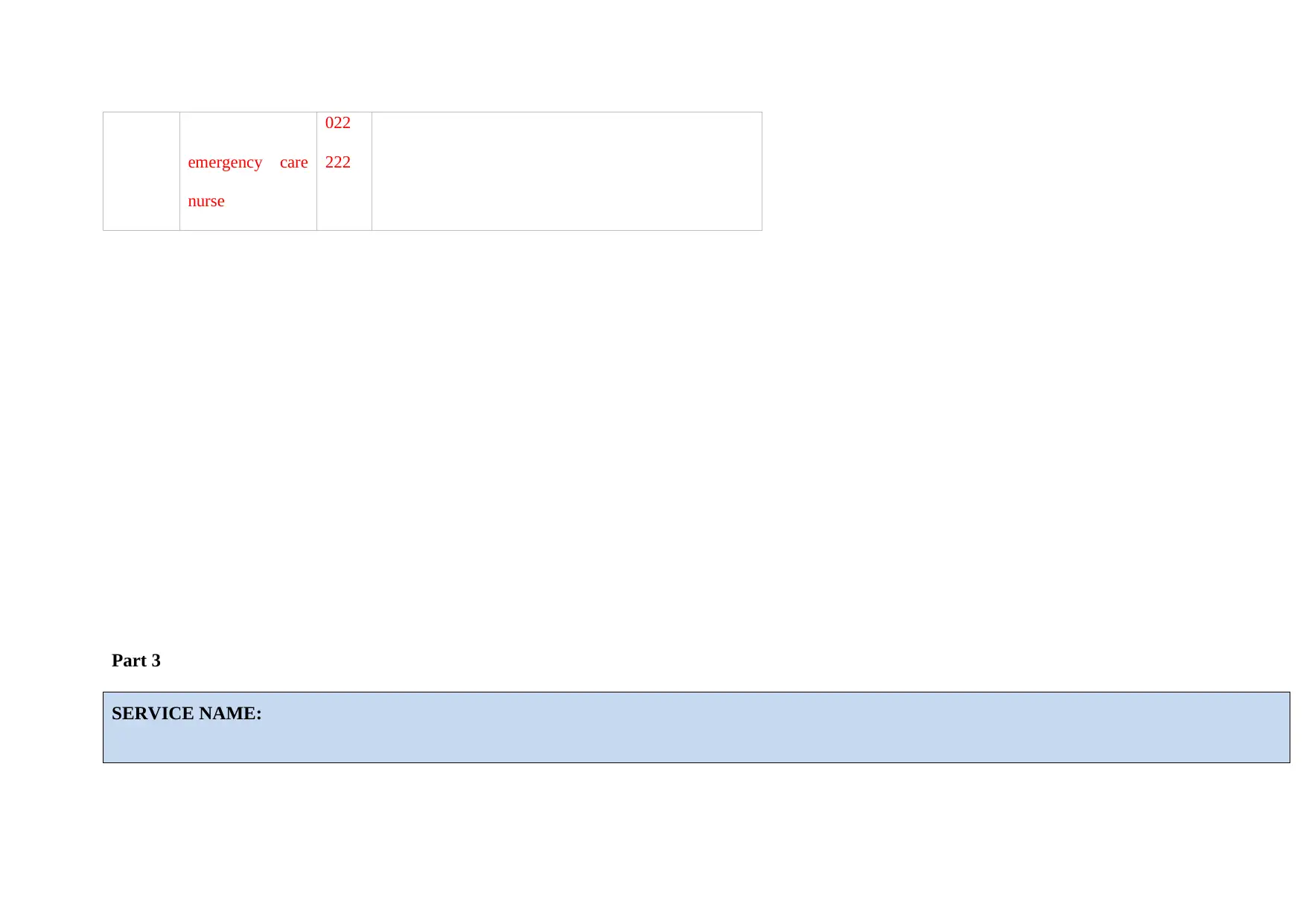
emergency care
nurse
022
222
Part 3
SERVICE NAME:
nurse
022
222
Part 3
SERVICE NAME:
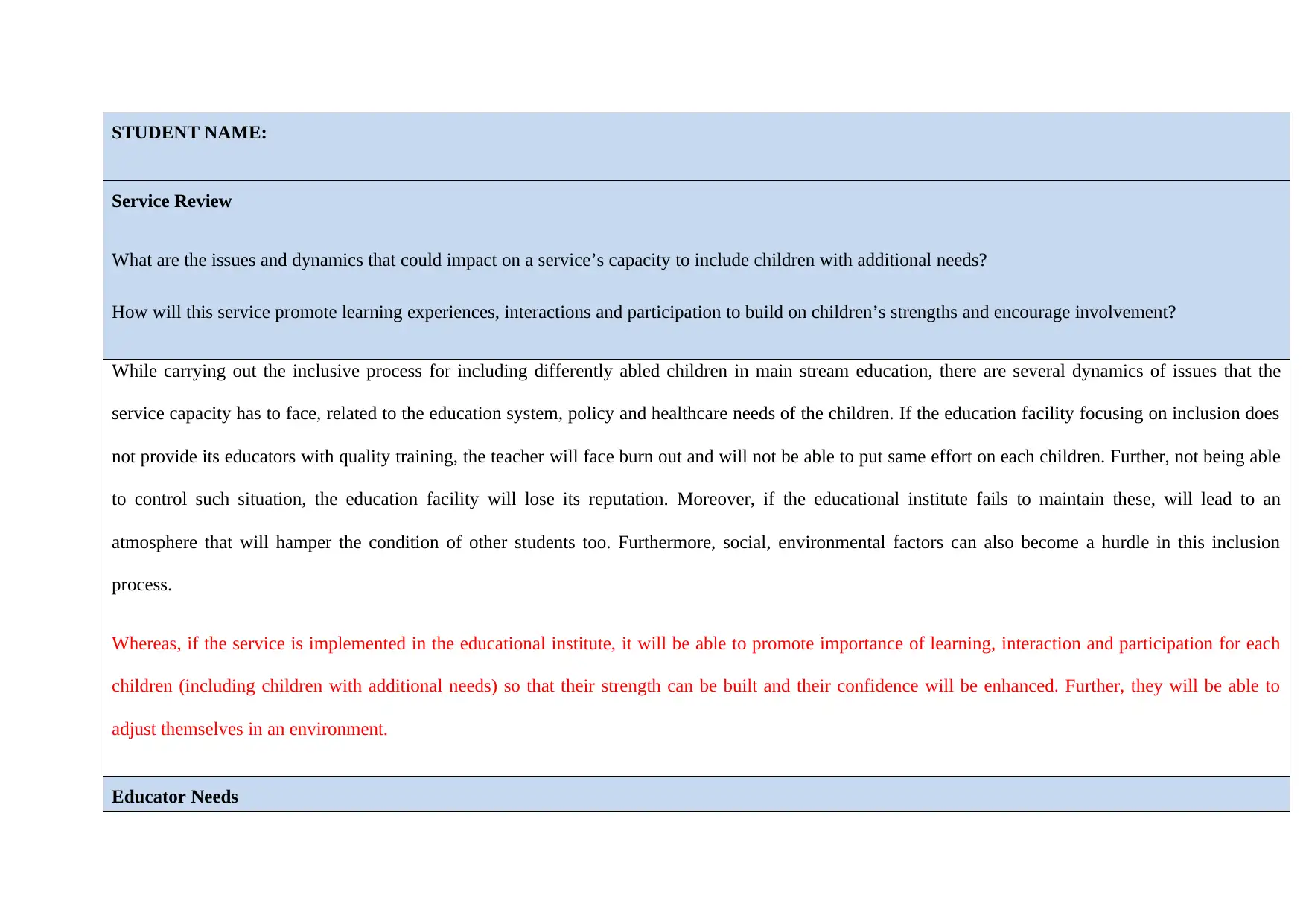
STUDENT NAME:
Service Review
What are the issues and dynamics that could impact on a service’s capacity to include children with additional needs?
How will this service promote learning experiences, interactions and participation to build on children’s strengths and encourage involvement?
While carrying out the inclusive process for including differently abled children in main stream education, there are several dynamics of issues that the
service capacity has to face, related to the education system, policy and healthcare needs of the children. If the education facility focusing on inclusion does
not provide its educators with quality training, the teacher will face burn out and will not be able to put same effort on each children. Further, not being able
to control such situation, the education facility will lose its reputation. Moreover, if the educational institute fails to maintain these, will lead to an
atmosphere that will hamper the condition of other students too. Furthermore, social, environmental factors can also become a hurdle in this inclusion
process.
Whereas, if the service is implemented in the educational institute, it will be able to promote importance of learning, interaction and participation for each
children (including children with additional needs) so that their strength can be built and their confidence will be enhanced. Further, they will be able to
adjust themselves in an environment.
Educator Needs
Service Review
What are the issues and dynamics that could impact on a service’s capacity to include children with additional needs?
How will this service promote learning experiences, interactions and participation to build on children’s strengths and encourage involvement?
While carrying out the inclusive process for including differently abled children in main stream education, there are several dynamics of issues that the
service capacity has to face, related to the education system, policy and healthcare needs of the children. If the education facility focusing on inclusion does
not provide its educators with quality training, the teacher will face burn out and will not be able to put same effort on each children. Further, not being able
to control such situation, the education facility will lose its reputation. Moreover, if the educational institute fails to maintain these, will lead to an
atmosphere that will hamper the condition of other students too. Furthermore, social, environmental factors can also become a hurdle in this inclusion
process.
Whereas, if the service is implemented in the educational institute, it will be able to promote importance of learning, interaction and participation for each
children (including children with additional needs) so that their strength can be built and their confidence will be enhanced. Further, they will be able to
adjust themselves in an environment.
Educator Needs
⊘ This is a preview!⊘
Do you want full access?
Subscribe today to unlock all pages.

Trusted by 1+ million students worldwide
1 out of 22
Related Documents
Your All-in-One AI-Powered Toolkit for Academic Success.
+13062052269
info@desklib.com
Available 24*7 on WhatsApp / Email
![[object Object]](/_next/static/media/star-bottom.7253800d.svg)
Unlock your academic potential
Copyright © 2020–2026 A2Z Services. All Rights Reserved. Developed and managed by ZUCOL.





